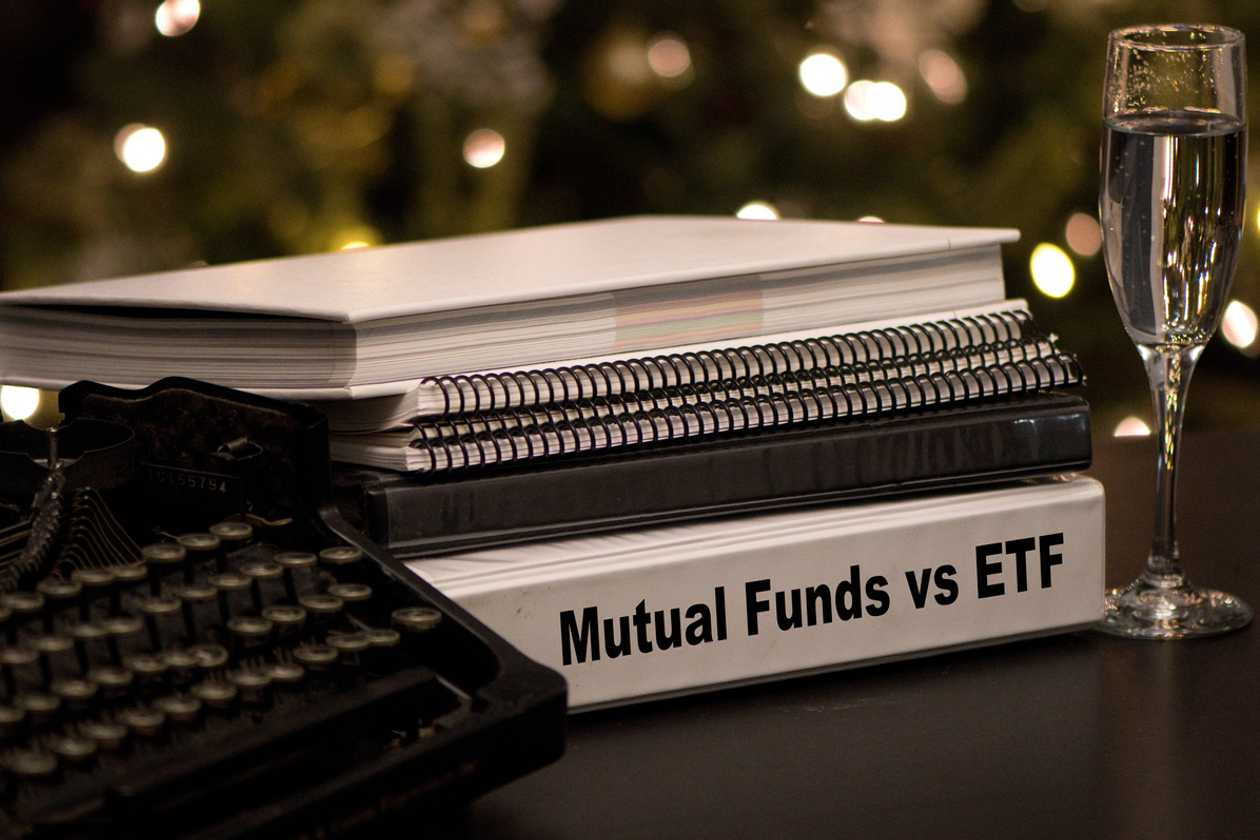
Mutual fund, index fund, ETF — WTF? Traders can rapidly and simply discover themselves overwhelmed by waves of economic jargon and acronyms once they first set off to construct a portfolio. Starting buyers are additionally suggested to place their cash in a few essential and beginner-friendly automobiles: ETFs and mutual funds.
Each ETFs and mutual funds have some essential traits that make them superb for buyers who’re simply getting began. However in addition they have some key variations — variations which might be vital to know and be aware of when you hope to resolve to make the right or best-advised resolution on your portfolio.
What’s an ETF?
“ETF” is an acronym that stands for exchange-traded fund. ETFs are, in some ways, just like commonplace shares in that they commerce on inventory markets, and buyers should purchase shares of them in a taxable brokerage account or retirement account. There are additionally tons of them available on the market, making them an often-preferred selection for newer buyers.
In brief, an ETF is sort of a diversified basket of investments, which is essential for some buyers. For instance, an ETF may embrace blue-chip shares, municipal bonds, and publicity to treasured metals. Shopping for a share of that ETF would give buyers a bit little bit of possession over all of these investments, relying on the fund’s particular make-up.
ETFs are fairly easy to purchase. You should buy shares of an ETF identical to you’ll a inventory, and there are so much to select from. As of the autumn of 2022, there have been greater than 3,000 ETFs listed on the New York Inventory Alternate, comprising practically $6 trillion in property.
What’s a mutual fund?
A mutual fund can be a well-liked funding automobile that includes a number of buyers pooling their assets to purchase an array of securities and property, usually with an overarching purpose or goal. If a bunch of buyers was seeking to take an aggressive method to investing and develop their cash comparatively rapidly, they might put money into a mutual fund that takes their pooled cash and invests it in development shares with the goal to garner massive returns rapidly. Mutual funds have traditionally been actively managed, which implies the fund pays managers and their employees to choose investments for the fund based mostly on a pre-determined technique.
However mutual funds can be index funds, which implies the fund tracks an index just like the Dow Jones Industrial Common or the Commonplace and Poor’s 500 index, also referred to as the S&P 500, which is a market-cap weighted index of the most important 500 publicly traded firms within the U.S. The primary index fund, the Vanguard First Index Funding Belief courting from the mid-Nineteen Seventies, can be a mutual fund.
Mutual funds vs. ETFs: Similarities and variations
Here’s a rundown of among the key similarities and variations when discussing ETFs versus mutual funds:
Similarities
- Each are pooled funding funds, providing a level of built-in diversification.
- ETFs and mutual funds typically have related administration or custodial charges.
- There are quite a few varieties of every, together with actively-managed funds, or funds that observe indexes.
- Each have their very own dangers (as do all investments), and it’s attainable that buyers may lose their cash if the fund goes belly-up.
Variations
- The best way the 2 are priced differs: ETFs are priced through the inventory market, whereas mutual funds are valued based mostly on their internet asset worth (NAV) on the finish of every day.
- ETFs are bought on the open market, whereas mutual fund shares are bought from the fund itself.
- Mutual fund and ETF returns could also be taxed in another way: Traders could owe capital good points taxes on each mutual funds and ETFs in the event that they promote their shares, however buyers additionally owe taxes on mutual fund distributions if the fund supervisor sells shares inside the fund to accommodate shareholder redemptions or to rebalance the fund itself. The best way ETFs are structured, actions inside the fund usually are not taxable occasions, making ETFs topic to fewer taxes.
ETFs vs. Mutual Funds: Similarities and Variations
|
Each are pooled funding funds. |
|
|
Each have related charges. |
How and the place they’re bought. |
|
ETFs and mutual funds are available a wide range of varieties. |
Potential taxation variations. |
ETFs or mutual funds: Deciding which is true on your portfolio
As with all funding resolution, there are a selection of issues to consider when debating whether or not ETFs versus mutual funds are proper on your portfolio.
When to contemplate ETFs
ETFs could also be a sensible choice for buyers who prefer to take a extra lively position in managing their portfolio. You may commerce ETFs like shares, so getting in on some market motion every so often could present a enjoyable and academic method to dip your toes into the market motion. Taxes are one other factor to remember: ETFs could also be extra tax-efficient than mutual funds.
When to contemplate mutual funds
When you’re extra of a “set it and neglect it” kind of investor, mutual funds could also be a better option for you. You received’t must actively commerce mutual fund shares such as you would ETFs or make many (if any) funding selections in any respect in lots of instances. When you belief your cash to professionals who assume they will beat the market somewhat than your personal analysis or instincts, a mutual fund will be the method to go.
Get recommendation from knowledgeable
As all the time, you could need to sit down with a monetary skilled for extra steerage. WiserAdvisor will give you contacts to close by monetary advisors who can reply your questions.
Do ETFs and mutual funds pay dividends or distributions?
Traders put their cash to work for one cause, typically: to make more cash. And one of many extra widespread ways in which investments can generate extra returns on prime of market appreciation is thru dividends and distributions, which is when buyers get a reduce of the income that an organization generates.
Each ETFs and mutual funds pay out distributions or dividends, however the specifics come right down to the person funds themselves. For example, many, if not most ETFs pay out money dividends each quarter, very similar to a single-company inventory would. Mutual funds, then again, may solely dole out distributions to fund homeowners as soon as per 12 months. However remember that there are funds that don’t pay out distributions in any respect, so if you wish to see dividends, you’ll want to do a little analysis to be sure you’re shopping for into the precise funds, be it ETFs or mutual funds.
Additionally, remember that ETF holders will see dividends or distributions correlated to the scale of their holdings. In different phrases, the extra shares of an ETF an investor owns, the larger their potential quarterly dividend cost. The identical is just not essentially true for mutual funds, although it will depend on the precise fund.
Are mutual funds safer than ETFs?
It’s not possible to say whether or not mutual funds, by and huge, are safer than ETFs, just because there are such a lot of totally different funds on the market, and a few are going to be “safer” than others. What may be stated, with confidence, is that each ETFs and mutual funds contain threat for buyers. There’s no such factor as a 100% risk-free ETF or mutual fund.
Whereas the construction of ETFs and mutual funds present some threat benefits as a result of they’re diversified the underlying property comprising every fund have their very own dangers too. Concentrated funds, resembling an ETF invested closely within the vitality sector, for instance, could carry extra dangers.
Mutual fund, ETF or each?
As mentioned, there are quite a few issues to contemplate and take into consideration when making an attempt to find out whether or not ETFs or mutual funds are higher on your portfolio. Each have some built-in benefits for buyers, however there are some key distinctions which will sway you to at least one or the opposite, like whether or not or not you prefer to perform a little lively buying and selling.
It’s essential to remember, too, that you simply’re not essentially relegated to picking one or the opposite — you’ll be able to put money into each! Provided that each are diversified funding varieties, they could be ideally suited to a younger or newbie investor’s portfolio. Simply bear in mind to do your homework, think about the dangers, and if wanted, communicate with a monetary skilled for additional steerage.
Incessantly requested questions (FAQs)
What occurs to my ETF if the corporate fails?
If the corporate that manages an ETF fails or in any other case liquidates, it should comply with a sure process which incorporates notifying shareholders. Sometimes, the shutdown course of includes shareholders getting paid out in money, however it may be messy.
Do you pay taxes on an ETF when you don’t promote?
No, you received’t set off a taxable occasion with an ETF till you promote it. At that time, you’ll be able to calculate any relevant capital good points taxes which may be due. However when you merely maintain onto an ETF in your portfolio, it received’t accrue a tax legal responsibility. If the ETF pays dividends, you’ll have to pay taxes on them.
Is 2023 a very good time to put money into mutual funds?
Most monetary professionals will in all probability inform you that any time is an effective time to put money into something, and that features mutual funds. Although the market has been roiled by financial points in 2023, a down market presents a chance to purchase or make investments at decrease costs. However once more, it is best to think about consulting knowledgeable for steerage earlier than making investing selections.
